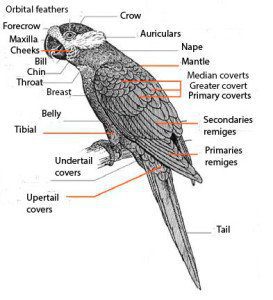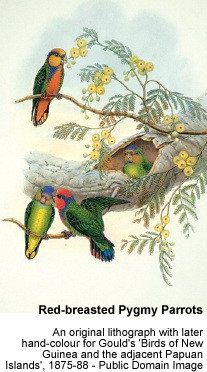Content
|
|---|
Description
9 cm.. length between 12 and 16 g. of weight.
The crown of the tiny Red-breasted Pygmy-Parrot (Micropsitta bruijnii) various of pink to Brown towards the nape; cheeks, chin and ear-coverts, pale pink; line that goes from eyes up to the nape, iridescent blue. Banda wide in the part back from the nape, iridescent blue, rest of the upper region Green with fine dark margins. The flight feather Black finely lined in green; under wing-coverts Green with centers black. feathers of the wings grey-black.
The underparts are pink, with collar narrow blue iridescent in the part superior of the chest, merging is in color green in them lower flanks and blue in the part back from the neck; sides chest, blue. Uppertail Pink dark. Central feathers of the tail of color blue opaque, dotted black; Black yellow-orange-tipped outer.
Bill grey, cere pink, irises brown; legs grey.
Female mainly green and devoid of underparts Roses and the neck Blue of the male. The crown Pink is replaced by the blue (with the exception of the front that is pink), and uppertail-coverts are of color green yellow, not pink. The wing feathers show some brands of color green and the throat is grayish white.
Immature are like females, but are orange in the underparts, and they have forecrown and lores White.
Note: scientific name bruijnii commemorates the Dutch merchant's feathers Antonie Augustus Bruijn.
- Sound of the Red-breasted Pygmy-Parrot.
Subspecies description
Habitat:

The microloro pechirrojo they can be observed in primary and secondary forests on mountain, along the forest margins, and also have been recorded in the Albizia moluccana, in coffee plantations. They are usually between 500 and 3.000 m, but they can be found at lower altitudes. There is a record of a wandering bird observed at the level of the sea.
The species is usually found in pairs or in groups of up to 20 individuals, quickly moving in small groups through the second half of upper canopy. They are most commonly found for their high-pitched calls..
Birds prefer the dead trees and can “Skip” from one branch to another in search of fungi and lichens to feed on. They also take fruit and flowers.
Unlike other Pygmy parrots, they build their cavities for nesting on the sides of the dead trees, not in termite mounds. The entrance tunnel leads up into the cavity and enters from the rear. One of the registered tunnels had 100 x 55 mm. with a coating of wood inside.
Reproduction:
The breeding season, according to sources, is between the months of December and April. The nest It is a hole in a stump or dead tree to an altitude that ranges between 3 and 4 meters above the ground; apparently one of these nests counted with the presence of one male and two females.
Food:
Fungi and lichens, Sometimes they feed on fruit and flowers.
Distribution:
Size of the area of distribution (reproduction / resident): 269.000 km2
The Red-breasted Pygmy-Parrot are distributed by the islands of Buru and Seram, and in the mountain forests along the New Guinea, the Bismarck Archipelago, and three of the Solomon Islands. In New Guinea, are observed in the mountains Tamrau and Parotia of Vogelkop, along the Onin Peninsula, and through the central mountain range, including the mountains, Kubor, and coming up to Adelbert, Saruwaged and Owen Stanley ranges in the North and Southeast. There are also in New Britain and New Ireland (Hans Meyer Range) and in Bougainville, Kolombangara and Guadalcanal in the Solomon Islands.
Subspecies distribution
Conservation:
• Current IUCN Red List category: Least concern
• Population trend: Stable
The size of the world population It has not been quantified, probably over the 100,000 specimens. The species is released between common and rare due to deforestation and loss of habitat in this limited range.
The population suspected to be stable in the absence of evidence of any reduction or substantial threats.
"Red-breasted Pygmy-Parrot" in captivity:
It is not in captivity. Difficult to keep alive for more than a few hours or days.
Alternative names:
– Red-breasted Pygmy-Parrot, Mountain Pygmy Parrot, Mountain Pygmy-Parrot, Red breasted Pygmy Parrot, Red-breasted Pygmy Parrot, Rose-breasted Pygmy Parrot (ingles).
– Micropsitte de Bruijn, Perruche pygmée de Bruijn (French).
– Rotbrust-Spechtpapagei (German).
– Papagaio-pigmeu-de-peito-vermelho (Portuguese).
– Microloro de la Montaña, Microloro Pechirrojo (español).
scientific classification:

– Order: Psittaciformes
– Family: Psittaculidae
– Genus: Meeki
– Scientific name: Micropsitta bruijnii
– Citation: (Salvadori, 1875)
– Protonimo: Nasiterna bruijnii
Images “Red-breasted Pygmy-Parrot”:
————————————————————————————————
“Red-breasted Pygmy-Parrot” (Micropsitta bruijnii)
Sources:
– Avibase
– Parrots of the World – Forshaw Joseph M
– Parrots A Guide to the Parrots of the World – Tony Juniper & Mike Parr
– Birdlife
– Photos:
(1) – A pair was found foraging on the trunk of a tree By high mehdhalaouate – lynx
(2) – © Bernard I've had enough – bernardvanelegem
– Sounds: Hans Matheve (Xeno-canto)


